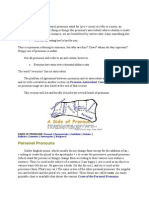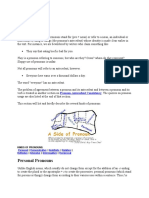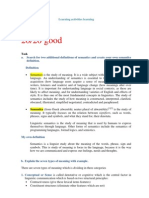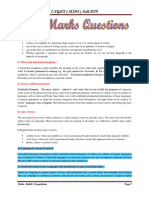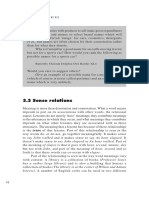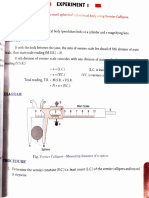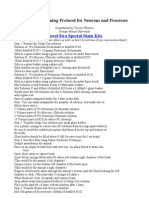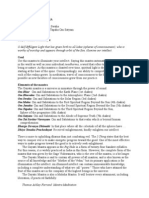GRE and Confusing Words
GRE and Confusing Words
Uploaded by
Jay CaoCopyright:
Available Formats
GRE and Confusing Words
GRE and Confusing Words
Uploaded by
Jay CaoOriginal Description:
Copyright
Available Formats
Share this document
Did you find this document useful?
Is this content inappropriate?
Copyright:
Available Formats
GRE and Confusing Words
GRE and Confusing Words
Uploaded by
Jay CaoCopyright:
Available Formats
6/14/14, 1:51 PM GRE and Confusing Words
Page 1 of 3 https://www.msu.edu/~defores1/gre/hom_usg/gre_conf_wrds.htm
Easily Confused Words and the GRE
The following easily confused words are likely to appear in the verbal sections of the GRE. These are not homonyms (words that are spelled the differently, have
different meanings, but sound and/or are spelled alike but have different meanings, such as they're, their, and there). There are two types:
1. words that have similar spellings but different meanings. When these words are confused for each other, it is usually because the reader is familiar with
one, but not the other (less commonly used) one. A good example is the pair: different and diffident.
2. A few are confused because their meanings overlap or because the words are used in related contexts. A good example of this type is the frequently
confused pair: infer, and imply.
I suggest you learn all these words. When you take the GRE, you'll find it was time well spent. Because the best way for you to learn to distinguish these words is
to learn both the spelling and the definition, I am not including definitions of most of the words in this list. Looking the words up in the dictionary will help fix the
new words in your memory. For really problematic words, however, I do give the definitions.
I've left blanks so you can write in definitions. Alternate shading pairs (or groups) similar words.
Printer Friendly Version
viscous
vicious
restive
restful
effect
affect
compass
compress
indigenous
indigent
ingenuous (and
disingenuous)
ingenious
(ingenuity)
infer
imply
insensible
insensitive
elusive
effusive
corroborate
collaborate
Back to Jessica's Home
Back to Main GRE Page
Vocabulary
Suffixes
Greek and latin Roots and
Affixes
Homonyms
MSU Learning Resources
Center
MSU Test Preparation
Consortium
MSU Home
6/14/14, 1:51 PM GRE and Confusing Words
Page 2 of 3 https://www.msu.edu/~defores1/gre/hom_usg/gre_conf_wrds.htm
collaborate
endemic
epidemic
dissemble
disassemble
difdent
different
(difference)
deference
deprecate
(deprecation)
depreciate
(depreciation)
ssion division into two or more parts: Nuclear ssion is the principle
behind nuclear weapons.
fusion joining of two or more entities into one, such as in nuclear fusion
(the joining of atomic nuclei) or fusion jazz (jazz that joins
elements from various musical traditions): They are attempting to
harness the energy produced by nuclear fusion
extant in existence; used especially to refer to the last surviving
examples of something passing out of existence, such as an
antique book or a nearly extinct species
extent length or amount: The extent of corruption in the bureaucracy
was well known.
incredulous
(credulous)
disbelieving, very doubtful
incredible
(credible)
difcult to believe
emulate to pattern one's behavior (on a respected role model)
imitate to copy
descry to make open or plain, by saying
decry to condemn
engender to bring into being
endanger to put at risk
ambiguous vague; capable of various interpretations
6/14/14, 1:51 PM GRE and Confusing Words
Page 3 of 3 https://www.msu.edu/~defores1/gre/hom_usg/gre_conf_wrds.htm
ambivalent being of two minds; holding conicting feelings or attitudes
discomfort (n) the lack of ease or comfort
aunt to display brazenly or pretentiously
out to show an obvious disregard or disrespect for; to treat
contemptuously
lied the past tense of lie, as in "He lied about his age to get into the
Army."
lied (pronounced
leed)
a song; a type German of song, meant to be sung, as opposed to a
purely instrumental tune (since this is actually a German word,
the plural is lieder, not lieds)
discomt (vt) to disconcert or make uncomfortable
You might also like
- Installation Manual - 3P678635-3E - RXYQ-BYMDocument68 pagesInstallation Manual - 3P678635-3E - RXYQ-BYMignatiusglenNo ratings yet
- 131 MT - 1 Practice QuestionsDocument14 pages131 MT - 1 Practice QuestionsJay CaoNo ratings yet
- GRE Homonyms and HomophonesDocument2 pagesGRE Homonyms and HomophonesJay Cao0% (1)
- The Structure of English LanguageDocument22 pagesThe Structure of English LanguageAna Rose BacalsoNo ratings yet
- Key - Revision Test - Units 1 and 2Document5 pagesKey - Revision Test - Units 1 and 2miss agusNo ratings yet
- They Is A Pronoun Referring To Someone, But Who Are They? Cows? Whom Do They Represent? Sloppy Use of Pronouns Is UnfairDocument6 pagesThey Is A Pronoun Referring To Someone, But Who Are They? Cows? Whom Do They Represent? Sloppy Use of Pronouns Is UnfairAn NguyenNo ratings yet
- SynonymsDocument10 pagesSynonymsMaeline MaeNo ratings yet
- ProseDocument8 pagesProsedaulet200388No ratings yet
- VocabularyDocument10 pagesVocabularyjgujarityNo ratings yet
- MorphemesDocument77 pagesMorphemesmavifourthNo ratings yet
- Linguistic ContextDocument6 pagesLinguistic ContextHaider MehboobNo ratings yet
- Prepositionals VerbalsDocument7 pagesPrepositionals VerbalsThioNo ratings yet
- Marites B. Miran: English TeacherDocument13 pagesMarites B. Miran: English Teacherjuvan05No ratings yet
- A Review of Grammar and SentencesDocument29 pagesA Review of Grammar and SentencesDonavan Tadia CabantacNo ratings yet
- Chapter - 08 - MorphologyDocument17 pagesChapter - 08 - MorphologyCarly AdinataNo ratings yet
- They Is A Pronoun Referring To Someone, But Who Are They? Cows? Whom Do They Represent?Document6 pagesThey Is A Pronoun Referring To Someone, But Who Are They? Cows? Whom Do They Represent?Nurul FathiniNo ratings yet
- Semantics:: ParaphraseDocument7 pagesSemantics:: ParaphraseEdward AlbolerasNo ratings yet
- 2009 IdiomsDocument4 pages2009 IdiomscheesehuynNo ratings yet
- GRE Sentence EquivalenceDocument25 pagesGRE Sentence EquivalencePriya ElangoNo ratings yet
- Pronoun: They Is A Pronoun Referring To Someone, But Who Are They? Cows? Whom Do They Represent?Document7 pagesPronoun: They Is A Pronoun Referring To Someone, But Who Are They? Cows? Whom Do They Represent?Tope Fatunbi StamNo ratings yet
- GrammarDocument71 pagesGrammarAnonymous rQfQJrZRNo ratings yet
- They Is A Pronoun Referring To Someone, But Who Are They? Cows? Whom Do They Represent? Sloppy Use of Pronouns Is UnfairDocument4 pagesThey Is A Pronoun Referring To Someone, But Who Are They? Cows? Whom Do They Represent? Sloppy Use of Pronouns Is UnfairJoseph SarzaNo ratings yet
- Deep and Surface Structure and AmbiguityDocument11 pagesDeep and Surface Structure and AmbiguityLogi CheminotNo ratings yet
- Šeškauskienė - LeksikologijaDocument14 pagesŠeškauskienė - LeksikologijaIngrida VerbickaiteNo ratings yet
- Semantics: Denotative Versus Connotative MeaningDocument12 pagesSemantics: Denotative Versus Connotative MeaningAbdellatifNo ratings yet
- Closed and Open Word Classes in Parts of Speech.Document17 pagesClosed and Open Word Classes in Parts of Speech.Shinto ThomasNo ratings yet
- Семінар1. лексикологіяDocument5 pagesСемінар1. лексикологіяДмитро ПадукNo ratings yet
- Lexical Ambiguity MariaDocument7 pagesLexical Ambiguity MariaSiti MoenaNo ratings yet
- Sense Relations Between Words Synonymy: To Leave - To Depart - To Clear Out - To RetireDocument54 pagesSense Relations Between Words Synonymy: To Leave - To Depart - To Clear Out - To RetireDenisa DragoţelNo ratings yet
- Sense RelationsDocument9 pagesSense RelationsLexyyyaNo ratings yet
- The Very Same or Very Different - A Study of The Degree of Synonomy Among Four NounsDocument46 pagesThe Very Same or Very Different - A Study of The Degree of Synonomy Among Four NounsVanjaNo ratings yet
- EnglishDocument44 pagesEnglishShakira Leslene StonecypherNo ratings yet
- MODULE 4 Semantics 201 PDFDocument5 pagesMODULE 4 Semantics 201 PDFShean Jerica SalemNo ratings yet
- Seminar 5, 6,7,8Document28 pagesSeminar 5, 6,7,8Євгеній БондаренкоNo ratings yet
- Lecture V. Working Definitions of Principal ConceptsDocument8 pagesLecture V. Working Definitions of Principal ConceptsHill CatNo ratings yet
- Unit 1 1.2 Key Concepts: What Are Grammatical Forms?Document6 pagesUnit 1 1.2 Key Concepts: What Are Grammatical Forms?Jose Luis Gomez DonosoNo ratings yet
- Module in English 10: Listening To Decipher Reductions in SpeechDocument11 pagesModule in English 10: Listening To Decipher Reductions in SpeechJessa LilaganNo ratings yet
- Tập bài giảng - Từ vựng-Ngữ nghĩaDocument93 pagesTập bài giảng - Từ vựng-Ngữ nghĩaMai HawnjNo ratings yet
- EAPP Module 1Document3 pagesEAPP Module 1Niña Miles TabañagNo ratings yet
- English Apsa PPT Group 4Document53 pagesEnglish Apsa PPT Group 4acrtannNo ratings yet
- Demonstrative Pronouns: DeterminersDocument14 pagesDemonstrative Pronouns: DeterminersnamasteamizadeNo ratings yet
- Teaching English Language Skills - Lecture 3Document16 pagesTeaching English Language Skills - Lecture 3eraykocamazNo ratings yet
- ContraLing - Week 7 - Worksheet - 0922Document12 pagesContraLing - Week 7 - Worksheet - 0922Nguyễn Anh DuyNo ratings yet
- Coherence and CohesionDocument8 pagesCoherence and Cohesionzahraawb123No ratings yet
- LESSON 1 Vocabulary The Key To MeaningDocument10 pagesLESSON 1 Vocabulary The Key To Meaningkuranji ruri100% (1)
- Distinguishing Between Polysemy and Homonymy.Document25 pagesDistinguishing Between Polysemy and Homonymy.Tâm Miu0% (1)
- Grammar and StyleDocument5 pagesGrammar and StyleoscarvanquelloNo ratings yet
- ISIDocument42 pagesISIZumrotul UluwiyyahNo ratings yet
- 20/20 Good: Learning Activity 1.1Document9 pages20/20 Good: Learning Activity 1.1Carmen BazurtoNo ratings yet
- ENG502 Midterm Subjective Paper DownloadDocument18 pagesENG502 Midterm Subjective Paper Downloadfazalrehmanabid71No ratings yet
- 3255 3828 1 SMDocument14 pages3255 3828 1 SMAdriana KerchnerNo ratings yet
- Cohesion and Coherence - 20231006 - 091250 - 0000Document49 pagesCohesion and Coherence - 20231006 - 091250 - 0000SteNo ratings yet
- Topic 11: Campos Léxicos y Semánticos en La Lengua Inglesa. Léxico Necesario para La SocializaciónDocument22 pagesTopic 11: Campos Léxicos y Semánticos en La Lengua Inglesa. Léxico Necesario para La SocializaciónmariaNo ratings yet
- Meeting 4 - English - Semantics - Kreidle-46-49Document4 pagesMeeting 4 - English - Semantics - Kreidle-46-49Muhammad ramdanilunyukNo ratings yet
- Apuntinis Grammar II (Autoguardado) (Recuperado Automáticamente)Document22 pagesApuntinis Grammar II (Autoguardado) (Recuperado Automáticamente)amina.menehemNo ratings yet
- Grammarpossesivesadjandpron 240521053743 7b15edd8Document26 pagesGrammarpossesivesadjandpron 240521053743 7b15edd8kmabuhanif_913184976No ratings yet
- Cohesion in Academic WritingDocument5 pagesCohesion in Academic WritingMilestone EgyptNo ratings yet
- GRE Vocabulary List: GRE Gmat Mcat LsatDocument15 pagesGRE Vocabulary List: GRE Gmat Mcat LsatVivek ChhabraNo ratings yet
- Worksheet ITL Week 7Document4 pagesWorksheet ITL Week 7anna pisarenkoNo ratings yet
- 100 Words Almost Everyone Mixes Up or ManglesFrom Everand100 Words Almost Everyone Mixes Up or ManglesRating: 4 out of 5 stars4/5 (3)
- Word Study and English Grammar A Primer of Information about Words, Their Relations and Their UsesFrom EverandWord Study and English Grammar A Primer of Information about Words, Their Relations and Their UsesRating: 2 out of 5 stars2/5 (4)
- Chem 150 PS1 2014Document5 pagesChem 150 PS1 2014Jay CaoNo ratings yet
- ASAMST 128AC LEC 001 Fa13 PDFDocument7 pagesASAMST 128AC LEC 001 Fa13 PDFJay CaoNo ratings yet
- The Treatment To Animal Classified Classes and Economics - Zakat Funds To Build Mosque and Construct Mosques in This Country (Usa)Document1 pageThe Treatment To Animal Classified Classes and Economics - Zakat Funds To Build Mosque and Construct Mosques in This Country (Usa)Jay CaoNo ratings yet
- UCN R.GolubDocument63 pagesUCN R.GolubAnonymous fOVZ45O5No ratings yet
- AutacoidsDocument43 pagesAutacoidsOdiete EfeNo ratings yet
- AnalogyDocument9 pagesAnalogyMichelle SejalboNo ratings yet
- Mónica Poza Diéguez: EducationDocument4 pagesMónica Poza Diéguez: EducationmonicapozaNo ratings yet
- Psychrometric Processes NumericalsDocument16 pagesPsychrometric Processes NumericalsDHADKAN K.C.No ratings yet
- ACI 533 5R 20 Guide For Precast Concrete Tunnel Segments 2020Document84 pagesACI 533 5R 20 Guide For Precast Concrete Tunnel Segments 2020haddad.marianne.23No ratings yet
- 40.4 Project Schedule-NewDocument1 page40.4 Project Schedule-NewTanvir Shawon100% (1)
- Chromatin Accessibility Dynamics During Chemical Induction of PL 20181Document20 pagesChromatin Accessibility Dynamics During Chemical Induction of PL 20181Benn BasilNo ratings yet
- 11th Physics Practical 1Document8 pages11th Physics Practical 1YashNo ratings yet
- l4 Complementary DietDocument45 pagesl4 Complementary DietNur Ainaa100% (1)
- Viet em Tieng AnhDocument50 pagesViet em Tieng AnhPham Ba DatNo ratings yet
- Lunar Wireless Power Transfer Feasibility Study: March 2008Document36 pagesLunar Wireless Power Transfer Feasibility Study: March 2008Nikhil ReddyNo ratings yet
- SumerDocument16 pagesSumerJuneyell Escobar100% (1)
- Ashley Goff EDU/HUS 325 Social Studies Activity Project "Community"Document14 pagesAshley Goff EDU/HUS 325 Social Studies Activity Project "Community"api-242664373No ratings yet
- G+2 NewDocument1 pageG+2 New39 - Deep MandokarNo ratings yet
- Golgi-Cox Staining Protocol For Neurons and Processes: Novaultra Special Stain KitsDocument3 pagesGolgi-Cox Staining Protocol For Neurons and Processes: Novaultra Special Stain KitstetrazolamNo ratings yet
- Year 9 Study Guide ChemistryDocument15 pagesYear 9 Study Guide Chemistryreem halawiNo ratings yet
- Johnson, R. T., & Johnson, D. W. (1986) - Cooperative Learning in The Science Classroom. Science and Children, 24, 31-32 PDFDocument2 pagesJohnson, R. T., & Johnson, D. W. (1986) - Cooperative Learning in The Science Classroom. Science and Children, 24, 31-32 PDFHam Daz100% (2)
- Astm D5501Document3 pagesAstm D5501mhmdgalalNo ratings yet
- CCN - Lab 2Document5 pagesCCN - Lab 2Engr Mir Muhammad JunoNo ratings yet
- XN-L - Reference Interval From General Information 2017Document4 pagesXN-L - Reference Interval From General Information 2017widiawaty100% (1)
- 7.modeling BaseflowDocument4 pages7.modeling Baseflowsugendengal100% (1)
- 1 s2.0 S1815385213000266 Main PDFDocument5 pages1 s2.0 S1815385213000266 Main PDFP NielsenNo ratings yet
- How Roles and Functions Contribute To Organisational PerformanceDocument4 pagesHow Roles and Functions Contribute To Organisational PerformanceIzza AhmadNo ratings yet
- BHR PR LitDocument4 pagesBHR PR Litdonald duckNo ratings yet
- Textbook EvaluationDocument2 pagesTextbook Evaluationmarketizna100% (1)
- Writing E8 (Unit 7-12)Document17 pagesWriting E8 (Unit 7-12)Linh Nguyễn KhánhNo ratings yet
- The Gayatri MantraDocument2 pagesThe Gayatri Mantraapi-3770775No ratings yet















